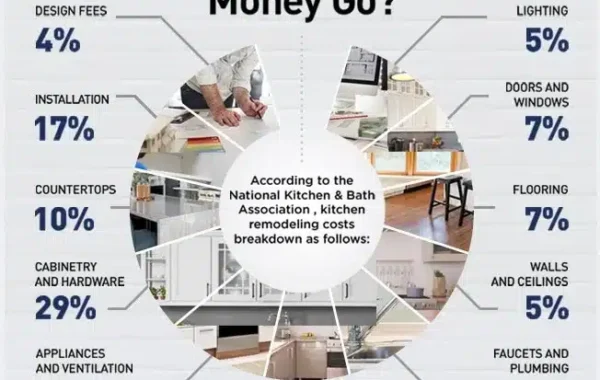The Importance of Permits for Remodeling Projects in Chicago Suburbs
Embarking on a remodeling project in Chicago Suburbs, whether it’s a kitchen overhaul or a bathroom refresh, brings excitement and the promise of a more beautiful and functional home. However, amidst the paint swatches and flooring samples, it’s crucial to remember a less glamorous, but equally important aspect: obtaining the necessary permits. Skipping this step can lead to headaches, fines, and even the need to undo completed work. This article will illuminate why securing remodeling permits is essential in Chicago Suburbs, helping you navigate the process with confidence.
Why Are Remodeling Permits Required in Chicago Suburbs?
Remodeling permits aren’t just bureaucratic red tape; they serve several vital purposes designed to protect homeowners and the community.
- Ensuring Safety and Code Compliance: Permits guarantee that your remodeling project adheres to the Chicago Suburbs building codes, which are in place to ensure structural integrity, electrical safety, plumbing standards, and fire resistance. These codes are regularly updated to reflect the latest safety advancements and construction best practices. A common oversight we’ve seen is homeowners neglecting proper electrical grounding during a basement finishing project, creating a potential fire hazard.
- Protecting Property Value: Properly permitted and inspected renovations add legitimate value to your home. Unpermitted work can raise red flags during a home inspection when you decide to sell, potentially devaluing your property or even hindering the sale.
- Avoiding Costly Problems Down the Line: Imagine completing a beautiful new deck, only to discover later that it violates setback requirements because you didn’t obtain a permit. You might be forced to tear it down and rebuild it, at significant expense. Permits help prevent these costly mistakes.
- Maintaining Insurance Coverage: If unpermitted work leads to a fire, flood, or other disaster, your insurance company might deny coverage, leaving you responsible for all the damages.
What Types of Remodeling Projects Typically Require Permits in Chicago Suburbs?
The specific requirements for remodeling permits can vary depending on your location within Chicago Suburbs (city, county, or village). However, as a general rule, permits are usually required for projects that involve:
- Structural Changes: This includes removing or altering load-bearing walls, adding new walls, changing the roof structure, or modifying the foundation.
- Electrical Work: Any new wiring, changes to existing wiring, or installation of new electrical fixtures typically require a permit.
- Plumbing Work: Installing new plumbing fixtures, altering existing plumbing lines, or connecting to the sewer system usually requires a permit.
- HVAC Systems: Installing or modifying heating, ventilation, and air conditioning systems often necessitates a permit.
- Additions: Adding any new square footage to your home requires a permit.
- Demolition: Demolishing a significant portion of a structure may require a permit, especially if it involves shared walls or impacts neighboring properties.
- Significant Exterior Alterations: Changing the exterior siding, windows, or roofing may require a permit, depending on local regulations.
Important Note: Even seemingly minor projects, like replacing a water heater or installing a new fence, might require a permit in some Chicago Suburbs jurisdictions. It’s always best to check with your local building department before starting any work.
How to Obtain Remodeling Permits in Chicago Suburbs
The process for obtaining remodeling permits in Chicago Suburbs generally involves these steps:
- Contact Your Local Building Department: This is the first and most important step. Contact the building department in your city, county, or village to inquire about permit requirements for your specific project. They can provide you with the necessary forms, information on fees, and specific code requirements.
- Prepare Your Plans and Documentation: You’ll typically need to submit detailed plans showing the scope of your project. These plans may need to be drawn by a licensed architect or engineer, depending on the complexity of the work. You may also need to provide documentation such as contractor licenses, insurance information, and product specifications.
- Submit Your Application: Once you have all the necessary documents, submit your application to the building department. Be prepared to pay a permit fee, which is usually based on the cost of the project.
- Undergo Inspections: After you receive your permit, you’ll need to schedule inspections at various stages of the project. These inspections are conducted by building inspectors to ensure that the work is being done according to code. A common point of inspection is after framing and before insulation, to verify structural integrity.
- Final Inspection and Certificate of Occupancy (if applicable): Once the project is complete, you’ll need to schedule a final inspection. If the work passes inspection, you’ll receive a certificate of occupancy (if required), which signifies that the project is safe and compliant with all applicable codes.
Navigating the Permit Process: Tips for Chicago Suburbs Homeowners
The permit process can sometimes seem daunting, but here are a few tips to help you navigate it smoothly:
- Start Early: Don’t wait until the last minute to apply for permits. The review process can take several weeks, so it’s best to start early to avoid delays.
- Be Thorough: Make sure your application is complete and accurate. Missing information can cause delays.
- Communicate with the Building Department: Don’t hesitate to ask questions. Building department staff are there to help you understand the requirements.
- Hire Qualified Professionals: Working with licensed and insured contractors who are familiar with local building codes can greatly simplify the permit process. They can help you prepare the necessary plans and documentation and ensure that the work is done correctly.
- Keep Records: Keep copies of all permits, plans, and inspection reports for your records.
Consider this real-world scenario: A homeowner we know in suburban Chicago decided to add a bathroom in their basement without pulling permits. They thought it would save time and money. However, when they went to sell their house, the unpermitted bathroom was discovered during the home inspection. They were forced to either remove the bathroom or obtain retroactive permits, which involved tearing into walls and ceilings to expose the plumbing and electrical work for inspection. The entire process ended up costing them significantly more than if they had obtained permits in the first place.
The Bottom Line
Obtaining the necessary permits for your remodeling project in Chicago Suburbs is not merely a formality; it’s a crucial step that protects your safety, your property value, and your financial well-being. By understanding the permit requirements, following the proper procedures, and working with qualified professionals, you can ensure that your remodeling project is a success from start to finish. Armed with this knowledge, you’re now better equipped to discuss your remodeling plans with a qualified contractor or architect and ensure your project complies with all local and state regulations.

